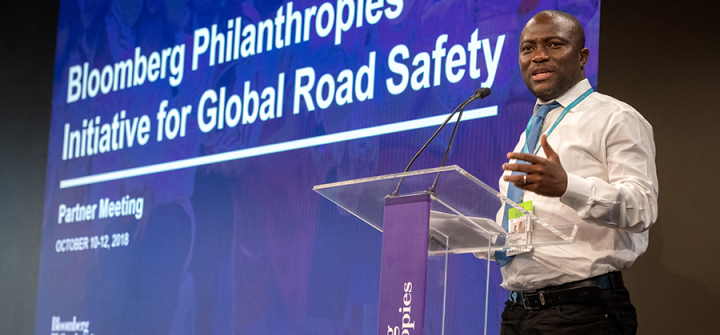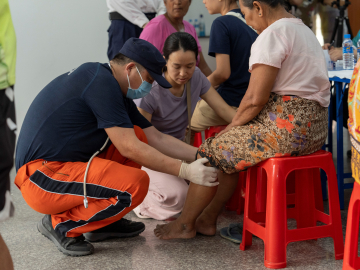Driving Change and Saving Lives
NEW YORK—The commitment of Mohammed Adjei Sowah, the mayor of Accra, Ghana, to make the streets of his city safer is more than a campaign promise. It’s a mission, borne of personal experience.
He knows all too well the hazards of road travel in the city of 2 million. In 2000, he was riding on the back of a motorbike with a friend—neither of whom were wearing helmets—when an oncoming car crossed the lane and struck the bike head on. Sowah was thrown from the bike and his friend went through the car windshield.
All involved in the crash survived, but Sowah didn’t walk away unscathed. The accident left him with chronic back pain that he lives with to this day.
Sowah shared the memory of his close call with others, who, like him, are dedicated to preventing road traffic crashes that each year kill more than 1.3 million and injure up to 50 million people worldwide. More than 120 partners of the Bloomberg Philanthropies’ Initiative for Global Road Safety gathered here on October 10 to share accomplishments and challenges in their efforts to make the world’s roads safer.
The Initiative, which supports 6 countries and 10 cities, helps to bring proven road safety interventions to places that have some of the highest traffic-related injuries and deaths in the world.
Thailand passed legislation last year that cracks down on drunk-driving and requires seat belt use. Ho Chi Minh City used cost-effective methods to make 150 high-risk intersections safer. Fortaleza developed a comprehensive pedestrian safety program, added bike lanes and launched a slow speed zone.
In Accra, the Initiative funded a road safety action plan that put numbers to road-related injuries and deaths, and identified the most dangerous travel routes, including the George Walker Bush Highway, crossed by more than 60,000 pedestrians an hour and the site of 16% of road crashes in the city. The highway is currently getting a makeover—widened medians, curb cuts for wheelchairs and an increase from 18 to 41 seconds at timed pedestrian crossings, “so people don’t have to run like a cheetah to cross,” Sowah said.
“We’re changing the discussion,” he said, “and bringing road safety to the fore.”
In his welcome to the Initiative partners, Michael R. Bloomberg stressed that road traffic injuries and deaths are preventable, something he learned as mayor of New York with the adoption of measures like pedestrian islands and protected bike lanes. The strategies helped to reduce traffic deaths 24% over his 12 years in office.
“We knew from experience that this issue really was solvable,” Bloomberg said. “After all, prevention is a major theme of our public health work at Bloomberg Philanthropies.”
Since 2007, the Philanthropies has committed $259 million to global road safety projects, an investment that has helped to save 125,000 lives in supported countries.
Data is the starting point for effective road interventions, advocacy and policies. Frequently, however, data collection processes in partner countries are poor. Crash reporting systems are often paper-based and lack the most basic information like speed, alcohol use and location.
“We need to know how many deaths, how many serious injuries and the locations,” explained Sara Whitehead, a consultant with Initiative partner, Vital Strategies. “Data is critical for setting targets, tracking trends over time and to make sure road safety broadly is on a country or city’s agenda as an issue of concern.”
In Mumbai, Vital Strategies helped police officials revise their crash reporting form to include more detailed information and transfer from a paper system to an electronic data system. In Addis Ababa, where only 35% of the city’s fatal crashes were recorded, experts provided technical assistance to streamline the software system and training for police investigators. Documentation of fatal crashes increased to 80%.
“Most of the work we’re engaged in is very low cost,” Whitehead said. “The key is getting staff to focus on the issue.”
Car safety is also a key focus of the Initiative, as many of the targeted cities and countries lack sufficient regulatory standards for vehicle safety, including Mexico, the world’s seventh top car manufacturer.
“Mexico makes cars with all the safety features, but they go to other countries and the cars that stay in Mexico don’t have the safety technologies,” said Valentina Ochoa, executive director of Refleacciona in Mexico, who works with 4 NGOs to improve car safety in the country.
Ochoa’s team developed the mass media education campaign How Safe is Your Car and a car-buying guide to educate consumers about car safety.
She said that carmakers wield power over federal authorities, arguing that consumers aren’t concerned with safety and that car safety features are too expensive.
Ochoa is hopeful that a changed political landscape—the result of recent elections—will open the door to meaningful car safety legislation.
“It’s not that industry doesn’t have the [safety] technology,” she pointed out. “They don’t have the will. It’s like saying to our citizens that their lives are not as valuable as lives in other countries.”
Ed. Note: Michael R. Bloomberg is a benefactor of the Johns Hopkins Bloomberg School of Public Health, which publishes Global Health NOW.
Join the thousands of subscribers who rely on Global Health NOW summaries and exclusive articles for the latest public health news. Sign up for our free weekday enewsletter, and please share the link with friends and colleagues: Subscribe to GHN
Mohammed Adjei Sowah, the mayor of Accra, Ghana, at a Bloomberg Philanthropies Global Road Safety partner meeting in New York on October 10, 2018. Image: Courtesy of Bloomberg Philanthropies.





